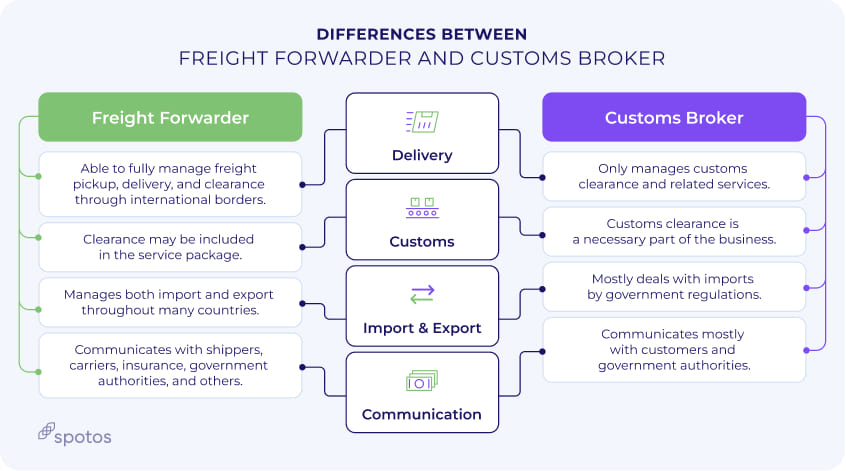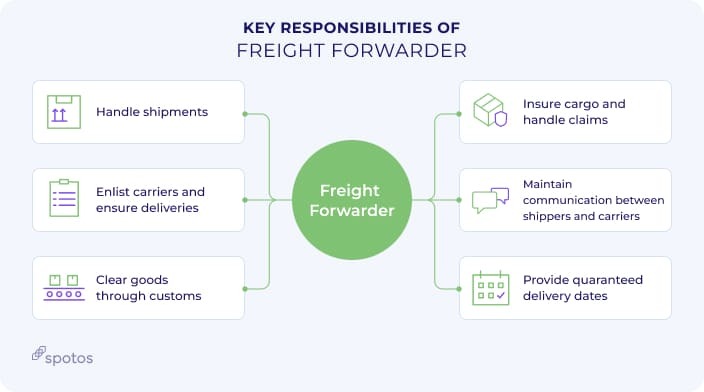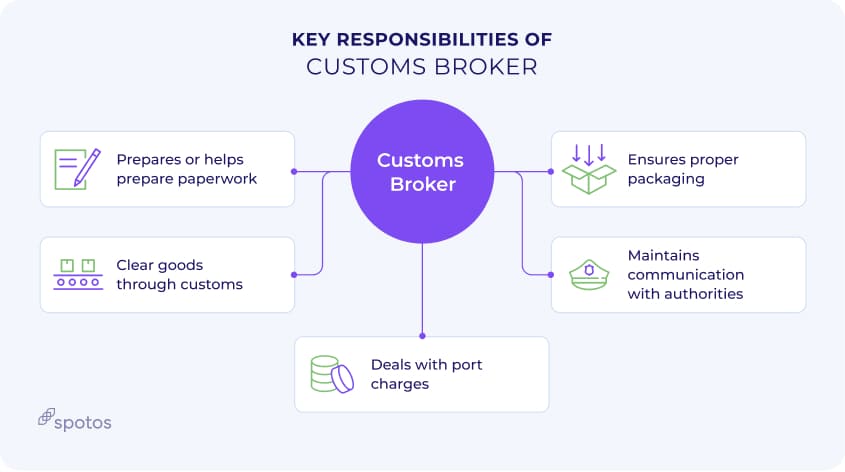Both freight forwarders and customs brokers offer similar services. They deal with imports and export and provide brokerage services. Yet, a freight forwarder does so much more than a customs broker.
While a freight forwarder provides more services related to the import and export process, many companies still use customs brokers. As such, the choice is tailoring the services according to your needs, as customs brokers and freight forwarders fill in valuable niches.
What is a freight forwarder?
A freight forwarder is a company or, in some cases, an individual with expertise in managing shipments and deliveries of goods on behalf of their customer. Some freight forwarders may also take care of the distribution of goods.
In other words, freight forwarders act as intermediaries between a manufacturer or a business that otherwise owns goods and every other company in the supply chain to ensure deliveries. Unlike customs brokers and other businesses, they deal with various institutions such as customs, insurance, carriers, etc.
Notably, most freight forwarders do not own trucks or other modes of transportation. Since they deal in international trade and cross-continent deliveries, owning trucks, most of the time, would not make much sense. So, a freight forwarder contracts carriers to do the deliveries of freight.
However, they take physical possession of the goods, providing their customers greater legal protection. In most countries, freight forwarders must be registered with relevant government motor authorities, have cargo insurance, and comply with many other regulations.
In the end, a freight forwarder is a full-service logistics provider. A freight forwarder handles everything from picking up goods to clearing and delivering them at a guaranteed time. They are intended for those companies who want to leave the shipping process to someone else.
In summary, freight forwarders:
- Handle shipments
- Enlist carriers and ensure deliveries
- Clear goods through customs
- Insure cargo and handle claims
- Maintain communication between shippers and carriers
- Provide guaranteed delivery dates
What is a customs broker?
A customs broker is a company or expert holding a license within countries such as the USA that assists businesses in customs entry and clearance. Licensed customs brokers handle the import and export process by communicating with customs and border protection, preparing the necessary paperwork, and informing businesses about requirements.
As such, customs brokerage is a smaller part of freight forwarding. While these companies are independent of freight forwarders, the latter might employ them to help with freight classification, dealing with port charges, and other customs and border protection intricacies.
Some shipping companies employ customs brokers purely for clearance procedures. Regardless of the country and the borders the freight crosses, customs clearance is still complicated, necessitating independent experts for most businesses.
In most countries, customs brokerage is a heavily regulated industry as it is an intermediary between businesses and trade authorities. As such, all legitimate customs brokers will be licensed.
In summary, a customs broker:
- Prepares or helps prepare paperwork
- Clears goods through customs
- Deals with port charges
- Ensures proper packaging
- Maintains communication with authorities
How is a freight forwarder different from a customs broker?
It’s easiest to understand the differences by considering freight forwarders as providing more extensive delivery service while customs brokers only handle moving goods through authorities. As such, the differences are quite immense, as shown in the following picture.

Freight Forwarder
- Able to fully manage freight pickup, delivery, and clearance through international borders
- Clearance may be included in the service package
- Manages both import and export throughout many countries
- Communicates with shippers, carriers, insurance, government authorities, and others
Customs Broker
- Only manages customs clearance and related services
- Customs clearance is a necessary part of the business
- Mostly deals with imports by government regulations
- Communicates mostly with customers and government authorities
When to choose a freight forwarder?
Any business involved in international trade can benefit from freight forwarders. A freight forwarder can benefit if goods are shipped across borders and taken to market.
So, freight forwarders are a catch-all business that is always beneficial. Even for companies with good positions in various markets and established distribution networks can be beneficial as many of the services can be negotiated or removed if not necessary.
However, it might be a bit more difficult to start using freight forwarders if your company already has an established network of carriers, brokerage services, and many agreements. Reworking all of these can take a significant amount of time, which would make the benefits from freight forwarders less appealing.
Finally, freight forwarders won’t bring much value to businesses that only ship domestically. However, since the logistics are much less complicated and most of the services will be irrelevant, other businesses in the industry might be of greater benefit.
When to choose a customs broker?
Customs brokers are best employed by those companies with international shipments but have an established network of carriers without legal expertise in clearance. A customs broker will be able to remove any roadblocks regarding importing goods.
A customs broker benefits those trying to break into new markets. Regulations differ across countries wildly, even with all the benefits of unified economic regions such as within the EU and USA. Figuring out all the intricacies of each country might take an enormous amount of time, so resources are better spent on getting the product to market.
Finally, brokerages are useful for those who want to avoid doing all the heavy lifting in ports and borders. Even with an in-house team, clearance can still go wrong, so that a customs broker would reduce the likelihood of goods getting stuck in limbo.
Frequently Asked Questions
Almost all freight forwarders will generally be customs brokers, but not the other way around. If a customs broker does forwarding, it’s usually considered a freight forwarder.
Yes. Almost all freight forwarders offer customs clearance services as they deal with international shipments.
No, a customs broker only deals with getting goods through borders and ports. They won’t take care of moving the cargo across or support shipments in any other way as freight forwarders would.
Both forwarders and customs brokers handle customs and clear out goods according to local legislation. Forwarders may also consult businesses that want to clear the goods themselves.
Both companies can be for the exam fee as they are legally considered a shipper’s contact.
No, most freight forwarders will handle customs for you, so a broker would be redundant.
If customs brokers and freight forwarders have agreements, usually, they will agree on a fixed fee or a percentage of revenue.


